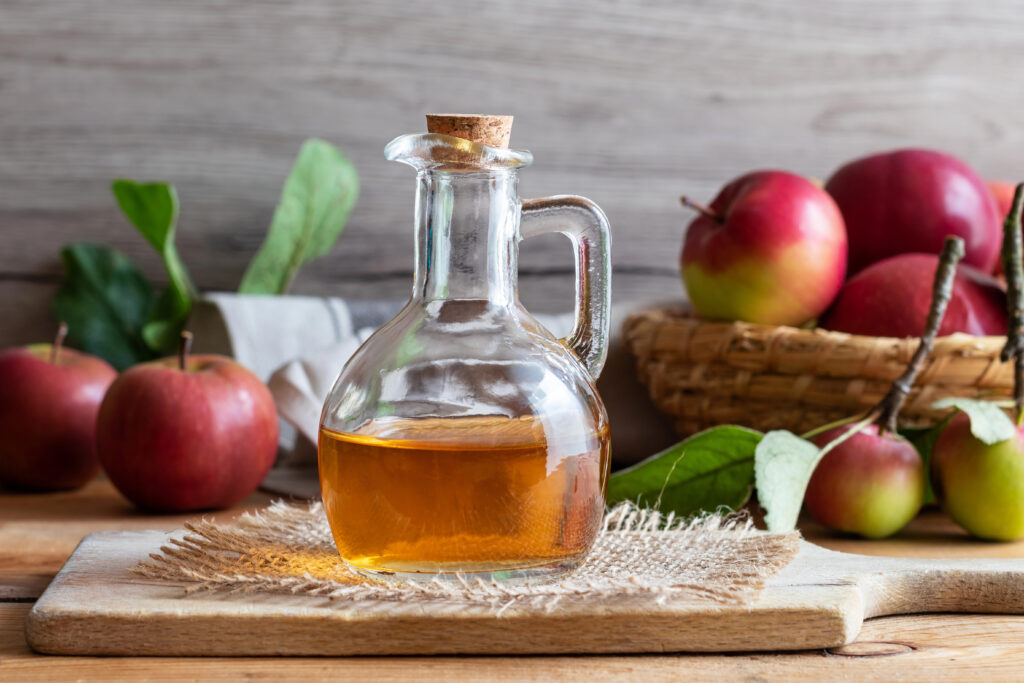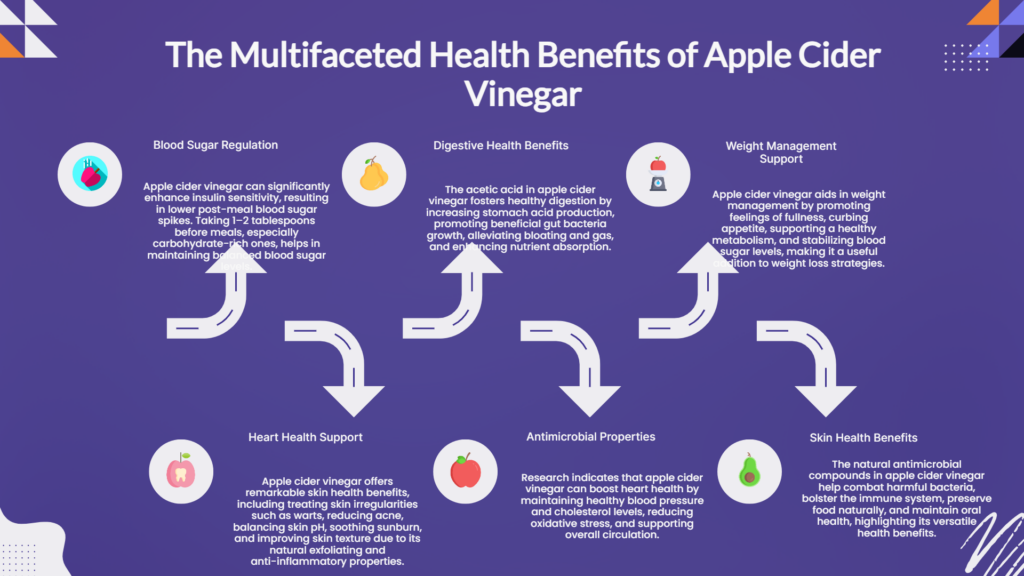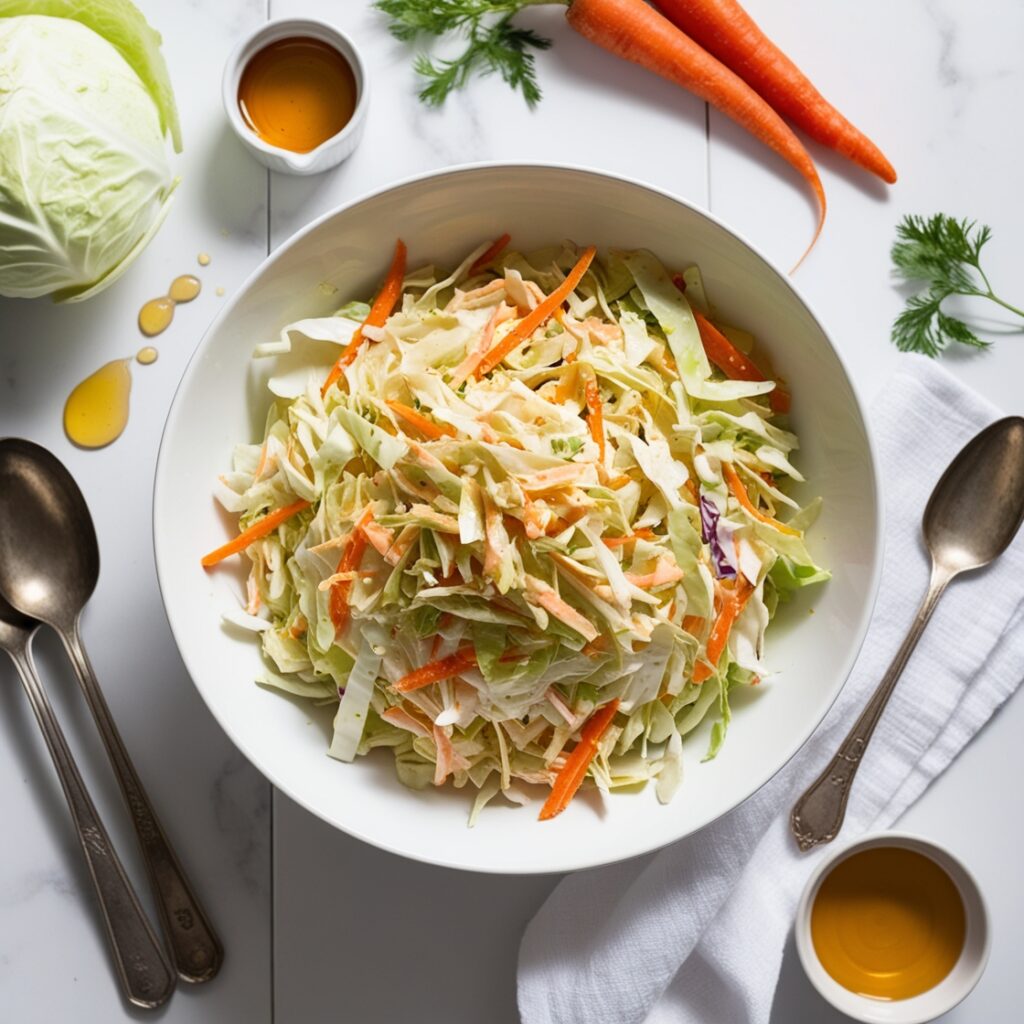Before I became a health advocate, I wasn’t a fan of apple cider vinegar at all. I remember when it became a huge health trend—everyone was talking about its miraculous benefits, but I remained skeptical. The strong, pungent smell and tart taste didn’t appeal to me, and I couldn’t understand why people were so enthusiastic about it. One question that frequently came up in my research was, “Is apple cider vinegar gluten-free?” This question became particularly important when I began researching natural, gluten-free ingredients for my family’s health needs.
Through extensive research and reviewing scientific studies, I discovered that apple cider vinegar isn’t just another health fad—it’s a versatile, beneficial ingredient with legitimate health properties. As someone who has a child with celiac disease, I’ve become particularly attentive to researching gluten-free ingredients. What started as skepticism has turned into genuine appreciation: apple cider vinegar has become a staple in my kitchen, not only for its safety regarding gluten, but also for its impressive versatility in cooking and its numerous health benefits.

Is Apple Cider Vinegar Gluten-Free?
Based on my findings, I can confidently confirm that pure apple cider vinegar is naturally gluten-free. The fermentation process uses only apples, which are naturally gluten-free fruits. However, I always emphasize the importance of reading labels carefully, especially on flavored varieties that might contain additional ingredients.
Bragg’s Organic Raw Unfiltered Apple Cider Vinegar is renowned for its purity and quality. Unfiltered and unpasteurized, it contains the “mother,” a beneficial blend of proteins, enzymes, and friendly bacteria. This makes it an excellent choice for those seeking to incorporate ACV into their daily health regimen.
- BRAGG APPLE CIDER VINEGAR: The raw, unfiltered, unpasteurized, original daily dose of wellness, made with 100% organic apples naturally fermented by live ‘Mother'
- ACV WITH MOTHER: Rigorously tested for the presence of live 'Mother'; Provides 750mg of acetic acid per serving
- DAILY DOSE OF WELLNESS: To easily incorporate ACV into your diet, add 1-2 tablespoons to 8oz of water or hot tea
- GREAT FOR RECIPES AND MORE: Enjoy in drink recipes, smoothies, salad dressings, sauces, slaws, and marinades; Use in your hair care or skin care routine
- MADE WITH ORGANIC APPLES: Produced with several varieties of organic apples; Never made with added color, processed sugars, or preservatives; USDA Organic, B Corp Certified, Non-GMO Project Verified, and Kosher
Understanding Apple Cider Vinegar’s Composition
In my studies of apple cider vinegar, I’ve learned that it’s made through a two-stage fermentation process:
- First Stage: Crushed apples are mixed with yeast to convert natural sugar into alcohol.
- Second Stage: Bacteria convert the alcohol into acetic acid.
This process uses no gluten-containing ingredients, making pure apple cider vinegar safe for those with celiac disease or gluten sensitivity.
Gluten and Its Sources
Having dedicated significant time to gluten-free living, I’ve become well-versed in identifying gluten sources. Gluten is a protein found primarily in:
- Wheat and its varieties (including durum, semolina, spelt)
- Rye
- Barley
The Impact of Gluten Content
For individuals with celiac disease or gluten sensitivity, consuming even small amounts of gluten can trigger adverse reactions. That’s why understanding the gluten content of common ingredients like vinegar is crucial for maintaining a safe diet.
Living with Celiac Disease
As a parent of a child with celiac disease, I’ve gained extensive knowledge about this autoimmune condition. Celiac disease occurs when gluten consumption triggers an immune response that affects the small intestine. Through careful study and discussions with healthcare providers, I’ve learned that this response can impact nutrient absorption and overall digestive health. This understanding has helped me develop better meal plans and dietary strategies.
A Guide to Vinegar Labels
Over time, I’ve learned to carefully evaluate vinegar products. Here’s what I check for:
- Pure apple cider vinegar should list only one ingredient.
- Watch for added flavors or seasonings that might contain gluten.
- Look for certified gluten-free labels when available.
- Be cautious of products manufactured in facilities that also process wheat products.
The Amazing Health Benefits of Apple Cider Vinegar
Blood Sugar Regulation
One of the most significant benefits I’ve discovered is apple cider vinegar’s ability to help regulate blood sugar levels. Research has shown that taking apple cider vinegar before meals can improve insulin sensitivity and reduce post-meal blood sugar spikes. I’ve found taking 1–2 tablespoons before carbohydrate-rich meals particularly helpful.
Digestive Health Benefits
Apple cider vinegar has become my go-to remedy for digestive issues. The acetic acid it contains supports healthy digestion by:
- Increasing stomach acid production to help break down food.
- Supporting the growth of beneficial gut bacteria.
- Reducing bloating and gas.
- Helping with nutrient absorption.
Country Farms combines the benefits of ACV with ginger, cayenne, and maple in their capsules, aiming to aid digestion, support healthy weight loss, and assist in detoxification. This blend enhances the traditional benefits of ACV with additional supportive ingredients.
- PROMOTES HEALTHY WEIGHT MANAGEMENT. Apple Cider has been praised for its health value for centuries. Studies suggest that taking apple cider vinegar may increase the feeling of fullness and help you eat fewer calories, helping lead to weight loss.
- ADDED GINGER, CAYENNE & MAPLE FOR ULTIMATE COMBINATION. The addition of ginger, cayenne, and maple helps boost immunity, increase calorie burning, and supports skin health. These 3 ingredients work together to support optimal wellbeing.
- LOADED WITH GOOD BENEFITS. ACV helps balance the body’s pH levels and has great health benefits due to the proteins, enzymes, and acetic acid it contains. Improving a healthy balance, ACV is a natural way to support skin, digestive and immune health.
- ADDITIONAL BENEFITS. Each serving of Country Farms Apple Cider Vinegar Capsules provides your body with 500 mg of apple cider and 100 mg of ginger, cayenne and maple to promote water balance as well as supporting intestinal and immune system health.
- WHAT’S INSIDE EACH BOTTLE. Each bottle of Country Farms Apple Cider Vinegar Capsules contains 90 capsules for a total of 90 servings per bottle.
Weight Management Support
While it’s not a magic solution for weight loss, I’ve found apple cider vinegar to be a helpful tool in maintaining a healthy weight. It works by:
- Increasing feelings of fullness after meals.
- Reducing appetite.
- Supporting a healthy metabolism.
- Helping stabilize blood sugar levels.
Antimicrobial Properties
The natural antimicrobial properties of apple cider vinegar have impressed me. It contains compounds that can:
- Fight harmful bacteria.
- Support immune system function.
- Help with the natural preservation of foods.
- Assist in maintaining oral health.

Heart Health Support
Research suggests apple cider vinegar may support heart health by:
- Helping maintain healthy blood pressure levels.
- Supporting healthy cholesterol levels.
- Reducing oxidative stress.
- Supporting circulation.
Skin Health Benefits
One of the most surprising discoveries in my research has been apple cider vinegar’s effectiveness in treating various skin conditions. While many know about its use in facial toners and cleansers, I’ve found evidence of its more remarkable applications. In fact, I’ve learned of its ability to treat skin irregularities, including warts—something that amazed me when I first discovered it.
I know someone who successfully treated a forehead wart using a simple overnight application method: applying apple cider vinegar on a cotton pad, securing it with duct tape, and repeating this process for just three days. When she told me about her experience, I was amazed. By the fourth day, the wart had completely disappeared. While I won’t mention her name here, as I haven’t gotten her permission yet, her story demonstrates the powerful properties of apple cider vinegar in treating skin conditions.
The effectiveness likely comes from its natural compounds:
- Acetic acid, which has antimicrobial properties.
- Natural acids that can help exfoliate dead skin cells.
- Anti-inflammatory components that soothe irritated skin.
- pH-balancing properties that support a healthy skin barrier function.
Beyond wart treatment, apple cider vinegar can help with:
- Reducing acne breakouts.
- Balancing skin pH levels.
- Soothing sunburned skin.
- Improving skin texture.
- Reducing age spots and hyperpigmentation.
For those interested in the external benefits of ACV, dpHUE offers an Apple Cider Vinegar Hair Rinse. This product leverages the natural cleansing and pH-balancing properties of ACV to gently clean the scalp and hair without stripping natural oils, promoting healthier and shinier hair.
- Don't Over Shampoo; Apple Cider Vinegar Hair Rinse removes impurities without stripping the natural oils that are essential to the health of your scalp and hair. Perfect for reducing shampoo use, it leaves your hair clean and soft.
- Post-Workout Rinse; Our formula is also a great post-workout refresh—gently removing sweat, oil, and buildup. Add ACV to your routine for a balanced, healthy scalp and effortlessly fresh hair.
- Help Soothe Your Scalp; Apple cider vinegar can help control scalp dryness and irritation. ACV Hair Rinse also incorporates Lavender Extract and Aloe Vera for added softness and conditioning.
- Keep It Colorful; dpHUE Apple Cider Vinegar Hair Rinse seals the hair’s cuticle with color-locking technology so you can keep your gorgeous color fresh and vibrant. It's a color-safe breakthrough for all hair types.
- Shine On; Dull, brittle or frizzy hair can be a result of high acidity brought on by perspiration and environmental factors. Apple cider vinegar helps to maintain the scalp’s pH, resulting in healthy, shiny hair.
Practical Tips for Including Apple Cider Vinegar in Your Daily Routine
Morning Routine
I start my day with a morning tonic:
- 1 tablespoon apple cider vinegar
- 8 ounces warm water
- 1 teaspoon honey (optional)
- A squeeze of lemon
- A dash of cinnamon
Pre-Meal Practice
Before larger meals, I often take:
- 1 tablespoon apple cider vinegar
- 4 ounces water
This helps with digestion and blood sugar control.
Cooking Applications
I’ve found creative ways to use it in cooking:
- As a meat tenderizer
- In homemade salad dressings
- For pickling vegetables
- In marinades and sauces
- As a flavor enhancer in soups and stews
Important Tips I’ve Learned
Through trial and error, I’ve discovered these crucial tips:
- Always dilute apple cider vinegar before consuming
- Start with small amounts and gradually increase
- Use a straw when drinking to protect tooth enamel
- Choose organic, unfiltered varieties with “the mother”
- Store in a cool, dark place
- Shake well before using
Delicious Gluten-Free Recipes Featuring Apple Cider Vinegar
Hearty Mediterranean Chickpea and Roasted Vegetable Salad

- 2 cups cooked chickpeas (rich in fiber and protein)
- 1 sweet potato, cubed and roasted
- 2 cups kale, chopped
- 1 red bell pepper, roasted and sliced
- 1/2 red onion, thinly sliced
- 1/4 cup fresh parsley, chopped
- 1/4 cup pumpkin seeds (for zinc and omega-3)
Dressing:
- 3 tablespoons apple cider vinegar
- 2 tablespoons extra virgin olive oil
- 1 clove garlic, minced
- 1 teaspoon raw honey
- 1 teaspoon dried oregano
- Sea salt and fresh black pepper to taste
Instructions:
- Roast sweet potato and bell pepper with a little olive oil at 400°F for 25 minutes
- In a large bowl, massage kale with 1 tablespoon of the olive oil until tender
- Combine all vegetables, chickpeas, parsley, and pumpkin seeds
- Whisk together dressing ingredients
- Toss everything together and let sit for 10 minutes before serving to allow flavors to meld
Refreshing Summer Coleslaw
- 4 cups shredded cabbage
- 1 grated carrot
- 1/4 cup apple cider vinegar
- 2 tablespoons olive oil
- 1 tablespoon honey
- Salt and pepper to taste

Instructions:
- Combine cabbage and carrot in a large bowl
- Whisk together vinegar, oil, honey, salt, and pepper
- Pour over vegetables and toss well
- Refrigerate for at least 1 hour before serving
Apple Cider Vinegar Marinade for Grilled Chicken
- 1/2 cup apple cider vinegar
- 1/4 cup olive oil
- 2 cloves minced garlic
- 1 tablespoon honey
- 1 teaspoon dried thyme
- alt and pepper to taste
Instructions:
- Combine all ingredients in a bowl
- Pour over chicken in a zip-top bag
- Marinate for 2-4 hours
- Grill chicken as desired

Making the Most of Apple Cider Vinegar: Key Takeaways
Before sharing my final thoughts, I want to emphasize the key points I’ve learned through my experience with apple cider vinegar:
- Quality Matters: Always choose organic, unfiltered apple cider vinegar with “the mother” for maximum benefits.
- Proper Usage: Dilution is crucial for both internal consumption and topical use.
- Label Reading: Check ingredients carefully, especially when gluten-free status is important.
- Versatility: From cooking to skin care, apple cider vinegar’s uses extend far beyond basic salad dressings.
- Safety First: While powerful, apple cider vinegar should be used mindfully and in appropriate amounts.
Final Thoughts
In this guide, we’ve explored the remarkable versatility of apple cider vinegar—from its rich history and fermentation process to its many practical applications in cooking, cleaning, and wellness routines. We’ve uncovered how to choose quality products, read labels, and seamlessly integrate this ancient ingredient into modern life.
Your wellness journey is unique, and apple cider vinegar could be a valuable addition to your daily routine. You can begin with something simple—perhaps a morning tonic or a zesty salad dressing. The possibilities are endless, and the potential benefits are worth exploring.
If you’re already using apple cider vinegar, how has it enhanced your daily life? Whether you’re looking for natural cleaning solutions, culinary inspiration, or wellness support, remember that mindful choices can lead to meaningful change. I’d love to hear about your experiences—share your story in the comments below and join our community of curious minds exploring the path to better living.

*We may earn a commission for purchases made using our links. Please see our disclosure to learn more.






